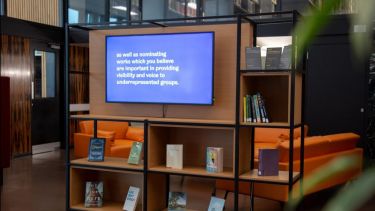In December 2018, the Library was asked by colleagues in the Faculty of Arts & Humanities what the library had planned for Black History Month. This simple question, or more so our realisation that we had planned absolutely nothing beyond an obligatory tweet or two helped us to realise that we are as guilty as so many other establishments in doing too little to try and redress historic injustices and imbalances of our society. That is how #ReadingForDiversity came to be.
We began to ask further questions about how we can offer a platform for students and staff from underrepresented groups. Can we, as a Library somehow offer people the chance to share their lived experiences or to challenge people’s reading habits and perceptions? Can we somehow use this opportunity to champion change?
Planning and launching
The idea for a curated reading list was formed, where each month we would celebrate a theme based around a day or month of recognition. For the project to stand out as something different to other reading lists curated by members of staff, consideration was given as to how this project could present authenticity. The very ethos of the project dictated that the process must be democratised, therefore student voices were essential to the success of this project. We decided that heartfelt nominations based on lived experiences would be the most poignant.
Initial conversations with students and staff soon confirmed what we knew; that our own collection lacked diversity. We realised that not only could this project help influence the reading habits of our audience, but by listening to the voices of underrepresented groups within society, we had the opportunity to diversify our own collection.
By February, the #ReadingForDiversity project was launched, with a video of suggested reading based around the theme of LGBT+ History Month. As well as the suggested books, we invited our audience to use the Recommend a Book form to recommend books by underrepresented authors or around a diverse theme.
The video and supporting social media campaign was met with great success, becoming our most engaged with campaign to date.
Our first theme was around the subject of LGBT+ History Month.
We continued the project for four months, releasing further monthly themes based on Working Class, BAME and international authors and subjects.
We received a large number of nominations, particularly around the themes of LGBT+ and Gender Identity.
The nominations soon formed a collection with its own display within Western Bank Library.
It soon became apparent from user engagement and the source of our book recommendations that the project was a great success amongst staff and Postgraduate Research students, however, very few undergraduate students were aware of the project.
Where next for #ReadingForDiversity?
At the end of 2019, The Library recruited a team of 5 Student Associates from a diverse range of backgrounds to reimagine the campaign. Unfortunately, the current pandemic has resulted in the project being placed on hold, but by recruiting students as co-creators for #ReadingForDiversty, we hope to add greater authenticity to the project, identify areas in which we can reach the broader undergraduate community, and really start to both challenge and inspire the reading habits of staff and students across the whole University.
Anecdotal evidence from the Student Ambassadors suggested that while the principle of the project was sound, the look and feel was very 'polished' and 'corporate'. They felt that student-generated content would feel significantly more authentic. Backed up by evidence that social media content produced or shared by peers is more trusted than content shared or produced by institutions or companies, this principle will help to reinterpret the way the project looks moving forward.
The Student Associates also facilitated the idea of a book giveaway, where a range of books would be distributed for free, with a plaque inside raising awareness of the project and promoting a #ReadingForDiversity book swap. Stands would be placed in each Library site, promoting a 'Take a book, leave a book' initiative, with a central theme of inclusivity and diversity.
Due to the current climate, and the pressures upon our student community to adapt to the change in working environment brought about by the COVID-19 pandemic, the difficult decision to postpone the involvement of the Student Associates until circumstances improve was reached.
In addition to #ReadingForDiversity, the University Library’s Subject Librarian for Arts & Humanities has curated a Black Lives Matter reading list, which aims to educate and inform our University community on the importance of the Black Lives Matter movement.
Alongside work to diversify and decolonise our collection, these initiatives are small steps in the right direction towards creating a more inclusive and diverse community within our University.
Hopefully, these small steps can help to inspire future academics by challenging the way we think about our own identities and the lived experiences of the wider community. Inspiring positive change should not be perceived as a challenge or an obstacle to overcome, but as something we should all embrace. Something which we can each contribute towards in order to strive for a truly welcoming and inclusive space for all.
Jesse Armstrong – Library Digital Communications Officer
For more content like this, head over to our Student Experience blog pages!




